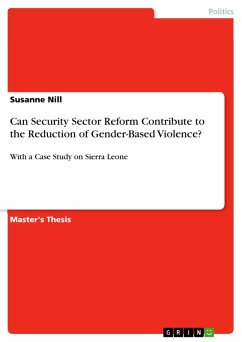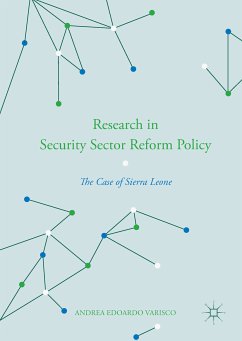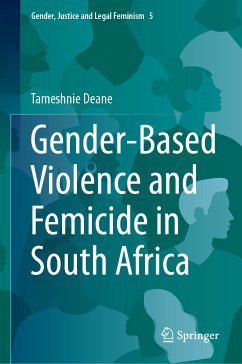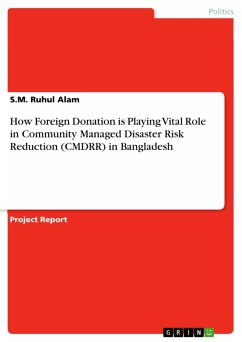
Can Security Sector Reform Contribute to the Reduction of Gender-Based Violence? (eBook, PDF)
With a Case Study on Sierra Leone
Versandkostenfrei!
Sofort per Download lieferbar
Statt: 47,95 €**
36,99 €
inkl. MwSt. und vom Verlag festgesetzt.
**Preis der gedruckten Ausgabe (Broschiertes Buch)
Alle Infos zum eBook verschenkenWeitere Ausgaben:

PAYBACK Punkte
0 °P sammeln!
Master's Thesis from the year 2011 in the subject Politics - Topic: Development Politics, grade: 1,7, University of Duisburg-Essen, course: Politikwissenschaften - Internationale Beziehungen und Entwicklungspolitik, language: English, abstract: The ambition of this thesis is to investigate the significance of gender issues for reforming the security sector. Further on it will be analyzed which gender-strategies are crucial for police reform and to which extent gender-sensitive police reform (GSPR) can contribute to a reduction of violence against women. The case study shall examine to which ex...
Master's Thesis from the year 2011 in the subject Politics - Topic: Development Politics, grade: 1,7, University of Duisburg-Essen, course: Politikwissenschaften - Internationale Beziehungen und Entwicklungspolitik, language: English, abstract: The ambition of this thesis is to investigate the significance of gender issues for reforming the security sector. Further on it will be analyzed which gender-strategies are crucial for police reform and to which extent gender-sensitive police reform (GSPR) can contribute to a reduction of violence against women. The case study shall examine to which extent gender issues were integrated in GSPR in Sierra Leone. Based on these findings, this analysis will develop recommendations how gender can be integrated successfully into security sector reform. The theoretical part of this paper illustrates the concept of security sector reform and its meaning for peace-building and development. In addition, relevant dimensions and actors are introduced combined with the exemplification of influencing factors and potential obstacles. Afterwards the concept of gender is discussed, including its relevance for development cooperation as well as a description of gender-based violence and its consequences. The theoretical part concludes by merging these two concepts and illustrates the relevance and strategies of gender-sensitive police reform. The second part of this analysis focuses on gender and police reform in Sierra Leone. This chapter begins with a brief description of the civil war in Sierra Leone as well as the prevalence of gender-based violence. Afterwards the chapter analyses to which extent gender-sensitive strategies were integrated in police reform. The paper concludes with recommendations for further gender-sensitive strategies in the security sector and argues if effective police reform can reduce the emergence of gender-based violence.
Dieser Download kann aus rechtlichen Gründen nur mit Rechnungsadresse in A, B, BG, CY, CZ, D, DK, EW, E, FIN, F, GR, HR, H, IRL, I, LT, L, LR, M, NL, PL, P, R, S, SLO, SK ausgeliefert werden.













